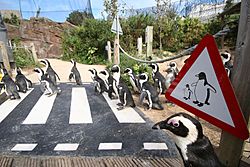Living Coasts facts for kids

Living Coasts Penguin Crossing
|
|
| Date opened | 14 July 2003 |
|---|---|
| Date closed | 16 June 2020 |
| Location | Torquay, Devon, England |
| Coordinates | 50°27′29″N 3°31′30″W / 50.458°N 3.525°W |
| No. of animals | Over 600 |
| No. of species | Over 50 |
| Annual visitors | 100,000+ |
| Memberships | BIAZA, EAZA, WAZA |
| Major exhibits | Auk Cliff, Penguin Beach, Underwater Tunnel, Mangroves: The Roots of the Sea, Local Coasts, Discover Zone |
| Website | www.livingcoasts.org.uk |
Living Coasts was a special coastal zoo located in Torquay, England. It was part of the Wild Planet Trust, a group that also runs Newquay Zoo and Paignton Zoo. This unique zoo focused on seabirds and other animals that live near the coast.
Living Coasts had a huge covered aviary, which is like a giant birdhouse where birds can fly freely. Inside, there were different areas for animals. These included a special beach for penguins, a tropical mangrove forest, and even places to watch animals underwater.
It was the first and only coastal zoo in Britain. Living Coasts was a member of important zoo groups like BIAZA, EAZA, and WAZA. These groups help zoos work together to protect animals.
Sadly, Living Coasts closed its doors permanently on June 16, 2020. This happened after it had to close temporarily because of the COVID-19 pandemic.
Contents
History of Living Coasts
Living Coasts first opened to visitors on July 14, 2003. Many people loved visiting, with over 100,000 guests coming each year by 2011. The zoo officially closed in June 2020. This was because it lost a lot of money during the COVID-19 pandemic.
The Giant Aviary
The main part of Living Coasts was its amazing aviary. This huge structure cost £7 million to build! It was 19 meters (about 62 feet) tall at its highest point. The aviary was a free-flying space for many different animals.
Animals living in the aviary included:
- South American fur seals
- African penguins
- Macaroni penguins
- Sea ducks
- Pied avocets
- Redshanks
- Black-necked stilts
- Ruffs
- Terns
This aviary was special because it was the world's first open-air exhibit for auks. It even won an award for its design! Living Coasts was also the first place in the UK to successfully breed pigeon guillemots, common guillemots, and tufted puffins. You could also see red-legged kittiwakes and red-billed choughs in the auk area.
Other Exciting Exhibits
Inside the aviary, there were also large aquarium tanks. These tanks held a total of 1,214 cubic meters (about 320,700 gallons) of water!
Mangroves: The Roots of the Sea
This exhibit opened in July 2009. It had big aquarium tanks with more than 20 different species. You could see three types of stingrays here. It was Britain's first major exhibit designed like a mangrove swamp. Mangrove swamps are special coastal habitats where trees grow in salty water.
Local Coasts Exhibit
The Local Coasts exhibit looked like the underside of a classic English pier. It was home to many native marine animals. These included seahorses, starfish, and edible crabs.
Discovery Zone
The Discovery Zone opened in March 2008. This area was very interactive and fun. It had a special floor and computer games about penguins. These games were called Penguin Academy.
Fun Programs and Activities
Living Coasts offered many exciting programs every day. Visitors could enjoy special shows and talks about the animals. There were also hands-on events.
Some programs let visitors be a keeper for the day. You could even be a junior keeper! Another popular activity was helping with the penguin feeds. If you were a certified SCUBA diver, you could even swim with the penguins for 45 minutes!
Visitor Facilities
Living Coasts had a cafe with amazing views of Torbay. There was also a gift shop called Tradewinds. Both the cafe and the shop were open to everyone, not just zoo visitors.
Why Living Coasts Closed
On March 23, 2020, Living Coasts, like many other attractions, temporarily closed. This was due to the COVID-19 pandemic and the national lockdown.
Even though the government later allowed zoos to reopen, Living Coasts remained closed. On June 16, 2020, the Wild Planet Trust announced that Living Coasts would close permanently. This decision was made because of the high costs of running the zoo and the need for major repairs. The zoo could not afford these expenses after losing so much income.
The most important task was to find new homes for all the animals. Thankfully, by June 19, 2020, it was announced that new homes had been found for every animal.
Images for kids


